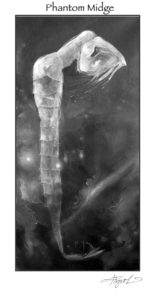By Declan McCabe
Earlier this winter, I took to the pond ice — not to skate, but to peek below the surface. Although lake ecologists once considered the plankton in frozen lakes to be dormant during winter, recent studies reveal that the plant-like, microscopic phytoplankton (which move with the lake’s currents) and animal-like zooplankton remain active below the icy surface.

In data collected from more than 100 lakes, Washington State University Professor Stephanie Hampton found that while the base of the under-ice food web is reduced compared to summer, it is certainly not dormant. Hampton’s research suggests that the phytoplankton supporting lake food webs is reduced by 80% compared to summer, while one level up the food web, the abundance of zooplankton falls by 75% in winter lakes.
Still, there is enough activity within that web to support a variety of winter lake life, something New England’s optimistic ice-fishing community has long understood. The fish, however, are certainly not hanging around in vain hopes of a sudden shaft of light through the ice and meals provided by humans like manna from heaven. They rely on a natural food web supported by phytoplankton, which harnesses the sun’s energy to make food. These phytoplankton are consumed by zooplankton, which are, in turn, large enough to provide tasty morsels for fish.
Just as the fish are not swimming around purely for the benefit of winter anglers, the zooplankton are not in it for the sake of fish. While fish and other organisms evolved as predators, there is no Darwinian imperative to become prey. Zooplankton evolved to avoid being eaten, and behavioral adaptations keep many species out of harm’s way.
One of these adaptations is akin to “the largest daily migration on Earth,” according to Ariana Chiapella, a research associate at the University of Vermont’s Rubenstein Ecosystem Science Laboratory. During the summer, many zooplankton species spend their days out of sight on lake floors, even though most of their food is near the bright surface. At night, protected from fishy nemeses by the veil of darkness, these zooplankton pop up to feast. The phantom midge, one of those nightly migrants, makes a living hunting smaller zooplankton by night and settling into the mud by day.
Most of the research documenting these nocturnal migrations has been done during summers. Chiapella and collaborators in Jason Stockwell’s UVM research group wondered if this and other daily migration also happens under winter’s ice, when instead of ponds being warmest at the surface, as they are in summer, the opposite is true. And so, one March morning, they took to Shelburne Pond with ice augers and plankton nets.
They sampled around the clock from just beneath the ice to more than 14 feet below the surface. To obtain their samples, the researchers lowered a pipe through ice holes and pumped five gallons of pond water up into buckets from each of several depths. After first sampling small volumes for microscopic phytoplankton, they poured remaining water through fine-meshed nets to collect the larger zooplankton.
In their first mid-day samples, there was no sign of phantom midges at any depth. What was common in the mid-day samples, however, was Daphnia mendotae, a water flea species commonly eaten by phantom midges. Nighttime samples told a different story. The phantom midges came up from depth at twilight and were found in the deepest samples. By midnight they were abundant at all depths from 14 feet deep to just beneath the ice surface. And their prey, the water fleas? They went deeper at midnight, and came up closer to the ice after sunrise when the phantom midges had gone to ground.
I asked Stockwell why the phantom midges did not simply track the water fleas and stay up both day and night. He reminded me that fish rely on daylight to find food, including phantom midges, so the midges dive because, as Stockwell said, “It’s better to be hungry than dead.”
These studies confirm that the base of the lake food web is alive, well, and migrating year-round, but perhaps on a calorie-restricted winter diet. My diet tends to follow an opposite pattern!
Declan McCabe teaches biology at Saint Michael’s College. You can hear his biweekly “Nature Snippets” wherever you find your podcasts. Illustration by Adelaide Murphy Tyrol. The Outside Story is assigned and edited by Northern Woodlands magazine and sponsored by the Wellborn Ecology Fund of the New Hampshire Charitable Foundation: nhcf.org.




